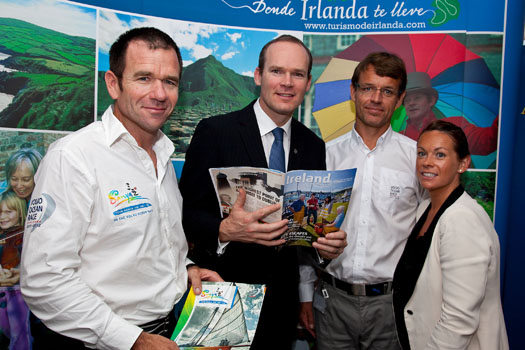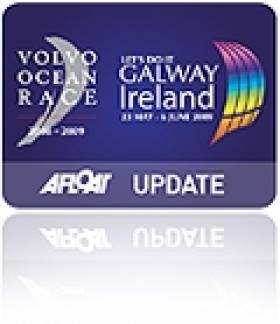Displaying items by tag: siomn
Marine Minister Showcases Galway at Volvo Race Start
#VOLVO OCEAN RACE – As the Volvo Ocean Race 2011-2012 kicks off tomorrow (5 November) from Alicante in Spain, Minister for Agriculture, Marine and Food Simon Coveney TD joined Tourism Ireland today, at a reception for key Spanish and international media contacts. As previously reported by Afloat.ie this week the event, which took place in the Volvo Ocean Race Village in Alicante, was an excellent opportunity to showcase Galway and Ireland as a fantastic holiday destination, kicking off Tourism Ireland's publicity drive around the world during the nine-month race to reach a huge audience of potential holidaymakers.

Mike Sanderson, skipper of Team Sanya, the Chinese/Irish boat; Simon Coveney TD, Minister for Agriculture, Marine and Food; Knut Frostad, CEO of the Volvo Ocean Race; and Barbara Wood, Tourism Ireland's manager in Spain, at the Tourism Ireland reception in Alicante, prior to the departure of the Volvo Ocean Race 2011-12 tomorrow
The Volvo Ocean Race attracts huge publicity around the world – with billions of people around the globe seeing it on TV, reading about it and tuning in to hear about it on the radio. Over the coming months, Tourism Ireland will be working in key markets where the race stops, to ensure that Galway and Ireland are in the spotlight.
Niall Gibbons said: "The Volvo Ocean Race attracts huge publicity around the world and with Galway due to host the grand finale, there's an ideal opportunity to showcase Galway and the west, and the many attractions that the island of Ireland has to offer as a holiday destination. The event is a great 'hook' for Tourism Ireland to reach a huge audience of potential holidaymakers."
Galway will host the final stopover of the Volvo Ocean Race 2011-2012 in July of next year. The 2009 stopover of the Volvo Ocean Race in Galway brought 40,500 international visitors to the city, as well as 269 journalists from around the world.






























































